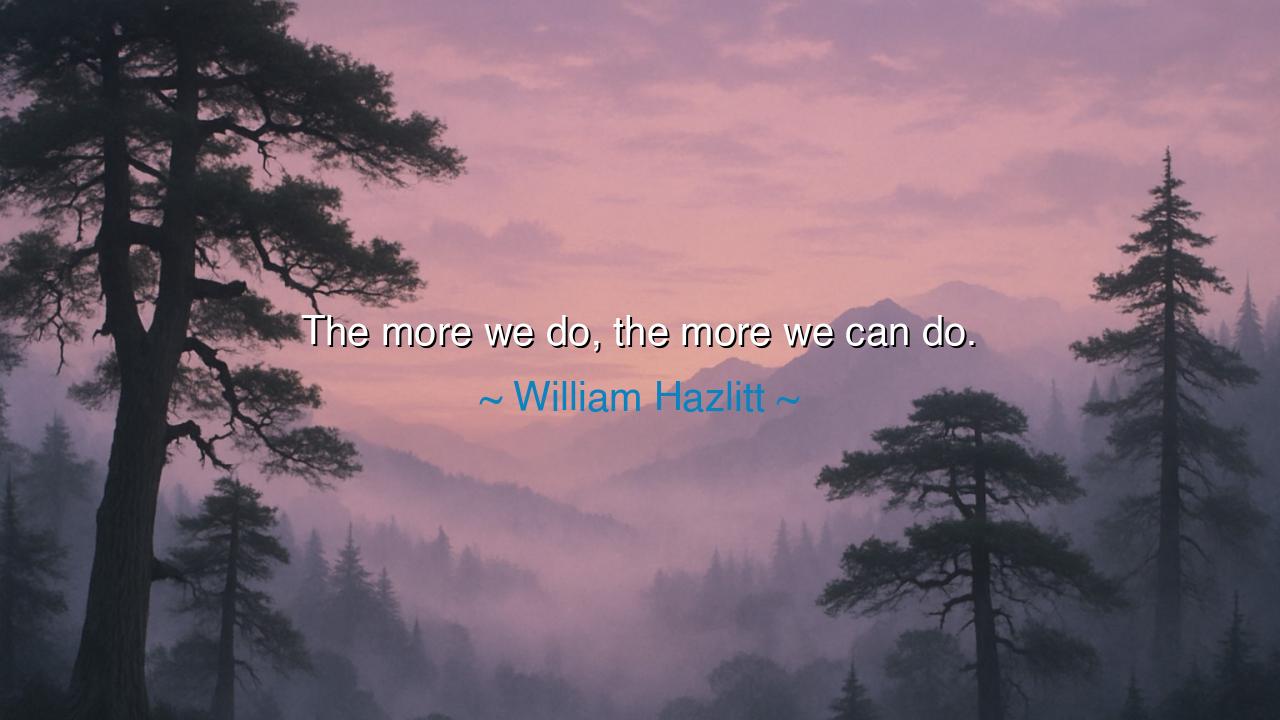
The more we do, the more we can do.






In the words of William Hazlitt, the fiery essayist and critic of the nineteenth century, we hear a law of human energy and growth: “The more we do, the more we can do.” This is no idle phrase, but a declaration of how strength is born. It teaches that action breeds capacity, and that the hand which labors grows not weary but strong. Just as a flame grows brighter when fed, so too the human spirit gains power through use. In every endeavor, in every struggle, in every repetition of courage, we extend the limits of what we thought possible.
The origin of this truth lies in the observation of life itself. Hazlitt was a man who wrote endlessly, filling pages with the vigor of his thought, and in doing so he discovered that each essay sharpened his mind for the next. He knew that talent is not a static gift but a living muscle, and that it flourishes only when exercised. To act, to strive, to push oneself beyond comfort, is to expand the horizon of one’s power. To be idle, to wait for readiness, is to wither before the journey even begins.
History resounds with proof of Hazlitt’s words. Consider Eleanor Roosevelt, who in her youth was timid and uncertain, often shrinking from the public eye. Yet as First Lady, she forced herself to act: to speak, to travel, to stand before hostile crowds and defend the causes of justice. Each deed gave her strength for the next, until she became one of the most influential voices of the twentieth century. The woman who once trembled in silence became a giant of courage because she lived Hazlitt’s law: the more we do, the more we can do.
The ancients too knew this principle. Homer’s heroes became great not by chance, but by battle upon battle, hardship upon hardship. Odysseus did not emerge cunning and resilient in a single trial, but by facing storms, monsters, and betrayals without rest. Each victory, each survival, made him more capable of enduring the next. Human greatness, the poets knew, is not given—it is forged in the fire of repeated action.
The meaning of Hazlitt’s words is thus both practical and profound. They remind us that capacity is not found—it is built. The man who says, “I cannot,” is often one who has not yet tried. The man who dares to act discovers hidden reserves, and the man who acts again multiplies them. Growth is not a mystery; it is the harvest of continual effort. Life does not shrink when challenged—it expands, like lungs filled with breath, like muscles hardened through labor.
The lesson for us is eternal: do not wait until you feel ready to begin, for readiness is born in the doing. Take the step, however small, and strength will follow. Do not shrink from work for fear it is too great, for each effort will enlarge your power to meet the next. Know that within you lies far more than you can see, and it will awaken only through trial. Remember Hazlitt’s law: the more we do, the more we can do.
Practical counsel is this: challenge yourself daily to act where you hesitate. Read more, and you will hunger to learn more. Speak more, and your voice will gain power. Work more, and your strength will increase. Keep a record of your victories, however small, and let them remind you of what growth truly is—the compounding of effort into ability, of action into mastery. Step by step, you will find that tasks which once seemed impossible become effortless.
Thus Hazlitt’s words endure as a torch for every generation: “The more we do, the more we can do.” They remind us that life is not fixed, that our powers are not sealed, that human capacity grows in proportion to its use. Children of tomorrow, let this law be written on your hearts: act, and you will grow. Work, and you will strengthen. Strive, and you will conquer. For in doing, you become, and in becoming, you find that there is no limit but the one you set for yourself.






AAdministratorAdministrator
Welcome, honored guests. Please leave a comment, we will respond soon